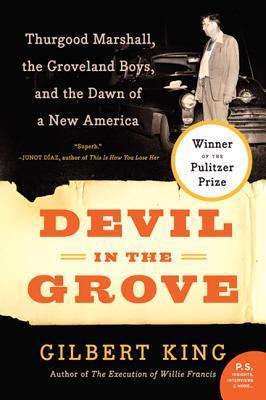More on this book
Community
Kindle Notes & Highlights
by
Gilbert King
Read between
December 31, 2024 - January 12, 2025
“nigger briefs.”
Rubin Stacy
riddling his body, that caused Marshall, drenched now in sweat, to stir in his sleep. It was the virtually angelic faces of the white children, all of them dressed in their Sunday clothes, as they posed, grinning and smiling, in a semicircle around Rubin Stacy’s dangling corpse. In that horrid indifference to human suffering lay the legacy of yet another generation of white children, who, in turn, would without conscience prolong the agony of an entire other race.
Norma Lee Padgett
The case was key to Marshall’s perception of himself as a crusader for civil rights, as a lawyer, willing to stand up to racist judges and prosecutors, murderous law enforcement officials, and the Klan in order to save the lives of young men falsely accused of capital crimes—even if it killed him. And Groveland nearly did.
“You know,” Marshall said to him, “sometimes I get awfully tired of trying to save the white man’s soul.”
jalopy
but Thurgood Marshall was demonstrating in case after case that their word was not the last, that in the U.S. Supreme Court the injustice in their decisions and verdicts could be reversed. He was “a lawyer that a white man would listen to” and a black man could trust.
national press had defined the riots as “the first major racial confrontation following World War II,”
“Lose your head, lose your case,” was the phrase Marshall’s mentor, Charles Hamilton Houston, had drilled into him in law school.
Rock of Gibraltar,
you’d better be on it because the sun is never going down on a live nigger in this town.”
Man Called White
Manhattan Project,
“A lawyer’s either a social engineer or he’s a parasite on society.”
Marshall had nothing but respect for serious women who were committed to achievement.
women. W. J. Cash, in his seminal exploration of Southern culture, The Mind of the South, wrote
“had nothing immediately to do with sex,” but rather with the feeling among Southerners that if blacks were to advance beyond their severely circumscribed social station, they might “one day advance the whole way and lay claim to complete equality, including, specifically, the ever crucial right of marriage.”
Under our constitutional system, courts stand against any winds that blow as havens of refuge for those who might otherwise suffer because they are helpless, weak, outnumbered, or because they are nonconforming victims of prejudice and public excitement.
Due process of law, preserved for all by our Constitution, commands that no such practice as that disclosed by this record shall send any accused to his death. No higher duty, no more solemn responsibility, rests upon this Court than that of translating into living law and maintaining this constitutional shield deliberately planned and inscribed for the benefit of every human being subject to our Constitution—of whatever race, creed or persuasion.
“the building did not fall and the world did not come to an end.”
a black man in a Jim Crow state standing up in court and talking to powerful white people without the slightest form of deference—all the while looking them straight in the eyes. And he wasn’t done.
From 1882 to 1930, Florida recorded more lynchings of black people (266) than any other state, and from 1900 to 1930, a per capita lynching rate twice that of Mississippi, Georgia, or Louisiana.
“If I, if I thought a white woman had been raped within a hundred miles of [Groveland] and Negroes were suspected, I would have opened the door and left.”
men; they were thus determined to put returning black veterans back in their place.


